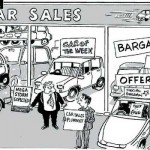 Most women know there is a 50% chance of buying a bad car when they go shopping for a secondhand one even when it shines so appealingly on a dealership showroom forecourt.
Most women know there is a 50% chance of buying a bad car when they go shopping for a secondhand one even when it shines so appealingly on a dealership showroom forecourt.
But who of us has heard of Akerlof’s economic law? Very few I’d suggest yet it applies well in the Used Car Market. I first read about this in Tim Harford’s book ‘The Undercover Economist’ – it explains that when one party to a sale has inside information and the other does not – markets do not work as well as they should.
Hence the 72k used car complaints recorded by Consumer Direct last year I suppose, costing innocent customers an estimated £85m to put right.
Take for example the case where a car dealer buys his stock of used cars, knowing fairly well from experience whether they are good or bad individual buys. Price, mileage (genuine or otherwise), service history, type of mileage, colour, condition; that sort of thing dictates the price he’ll charge knowing what he can make it look like with a bit of elbow grease and tlc.
But the customer doesn’t have the same background insight when she walks into the showroom. If she makes a low offer and gets the car, perhaps it was a lemon because the inside knowledge the salesman relies on is telling him that’s all it’s worth so take it… whereas a good car is worth more, hence his holding out longer for the asking price.
Clearly Akerlof knew his used cars (this works in other markets too of course) and that this is a hit and miss game that buyers and sellers play.
In general, used cars tend to be cheap and poor quality borne out by complaint levels in this area. Sellers want as high a price as possible so they’ll hold out for a better price for a good car but they can’t prove it is a good car so often the good car will sit around for longer.
Whereas a buyer who doesn’t understand the game goes away with a bad car unwittingly, thinking she has got a good deal. She hasn’t of course because the serious bills will start to arrive just as soon as any promising warranty runs out. That’s called Murphy’s Law. Marketers describe the sickening customer realisation that they’ve been shafted as ‘customer dissonance’ and I imagine we’ve all felt that at some time of our lives and determined never to go back…
The reality is that savvy car buyers don’t play a rigged shopping game like this one but there are many unsuspecting customers who don’t know the rules of the used car market and do end up playing here. Sadly many of them are females who trust the dealer who tells her what he needs to, to get the car off his forecourt.
Akerlof’s point is a serious one because this isn’t just a market where shoppers get ripped off, it’s a market that isn’t working properly because buyers want proof of value and VERY often sellers can’t prove this.
Of course the sensible advice is to buy a used car with a HPI type of finance check and then get it inspected for its mechanical fitness (at a discounted rate c/o DEKRA if you are a member of FOXY Lady Drivers Club) within the 6 months when you may be able to get a dealer to take it back or put things right, based on proof.
A reassuring female factor is likely to be an Approved Car stamp by a franchised dealership but the reality is still that the dealer salesman knows a lot more about the car than the customer and they need to sell it for as much as possible because their commission income is involved.
Certainly the customer needs more ammunition on her side so she can wise up in these instances. Depending on the value of the car I’d definitely counsel investing in checking out the mechanical condition of any secondhand car c/o car inspection experts, Dekra, as soon as possible after purchase; only then will you know if it’s a plum not a lemon.
FOXY
Please see OFT advice here and remember that if you are a member of FOXY Lady Drivers Club we’ll help you sort any used car complaints out – the last resort is that we’ll share really bad feedback within the Club so that other women don’t go there in future.
